Why getting it right matters more than you think
Imagine stepping into a room where your next opportunity could be decided. The first handshake. The first few seconds. And then the first question. Whether you are the interviewer or the candidate, this moment sets the tone for everything that follows.
At JobFitts Consultants, we have seen how a single question at the start of an interview can change the entire dynamic for better or worse. Let’s explore this from both perspectives.
For Jobseekers: How to Master the First Question
The opening question in an interview isn’t just a warm-up. It is your chance to establish rapport, show confidence and shape how the rest of the conversation unfolds.
Why It Matters
That first question, which is often something like ‘Tell me about yourself ‘sets the direction of the interview. It gives you the opportunity to share your story, express your motivation and connect with the employer’s needs.
Hiring managers are looking beyond the surface. They want to understand your communication style, self-awareness and cultural fit. Your answer can either build momentum or create friction. How you respond to ‘Tell me about yourself’ is very important.
What Makes a Strong Response?
- Be authentic: Avoid scripted answers. Speak with clarity, energy and honesty.
- Structure your response: Use a simple past-present-future format. Talk briefly about where you have been, what you are doing now and what you want to do next.
- Match the tone: Pick up on whether the environment is formal or relaxed and respond in kind.
- Engage the listener: End your answer with a positive hook or insight that invites further conversation.
Use storytelling to Stand Out
A well-told story captures attention and showcases your impact. Choose examples that reflect your values, skills and achievements. A successful interview hinges on a great story.
Make it relevant to the role and include a challenge, action and outcome.
Commin Pitfalls
- Starting with a chronological resume summary
- Being overly technical or vague
- Failing to connect your response to the role
How to Practise
Prepare a few talking points based on your experience and achievements but avoid sounding rehearsed. Record yourself and listen for clarity, tone and pacing. Better yet, practise with a recruiter or mentor who can offer constructive feedback.
Overall, when you practice your answer, you want to tell a great story about yourself that you can share in no more than two minutes.
For more job interview guidance and free downloadable resources, visit our Job Seekers Hub.

For Interviewers: Why Your First Question Shapes the Outcome
The first question is more than a formality. It’s a tool to help candidates relax, open up and show their best selves. A thoughtful opener creates psychological safety and sets the foundation for a productive, two-way conversation.
The Role of the First Question
- Establishes tone: A respectful, relevant first question shows the candidate this is a genuine conversation.
- Encourages rapport: People perform better when they feel seen, heard and understood.
- Influences the flow: Strong openings spark stories and insight. Weak ones trigger rehearsed monologues.
Move Beyond ‘Tell Me About Yourself’
While this question is common, it can often lead to surface-level responses. Instead, try intentional, role-aligned alternatives that invite reflection:
- What drew you to apply for this role?
- What recent project made you feel proud?
- Where do you feel you made the biggest impact in your last role?
- What kind of team environment helps you thrive?
Tailor Your First Question to the Role
- Creative roles: Can you share a project that excited you recently?
- Leadership roles: How do you approach building trust with new teams?
- Graduate or early-career roles: What have you enjoyed most in your studies or internships?
Avoid jumping straight into technical questions. A well-crafted opening invites richer conversation and helps you assess potential, not just experience.
For more resources on effective hiring, check out our Employer Solutions page:
The Psychology Behind It
Both jobseekers and interviewers benefit from a strong opening. It builds psychological safety, lowers stress and fosters genuine connection. Research from Harvard Business Review shows that early rapport in interviews often correlates with better hiring outcomes and long-term fit.
That first exchange isn’t just about facts. It’s about tone, trust and direction.
Final Thoughts
Whether you’re answering or asking it, the first question in an interview holds the key to a meaningful and productive conversation. Prepare with intent. Listen with curiosity. And lead with clarity.
Looking for Interview Support?
At JobFitts Consultants, we help candidates prepare with confidence and guide employers to make smart, sustainable hires. Our recruitment specialists have been placing corporate services talent across industries since 2003.











Share This
Share this post with your friends!